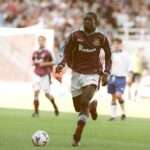No player on the basketball court has more responsibility than the point guard. He must be a leader both on and off the court, and he needs to rally his team together during trying situations. In addition, he must be a gifted athlete, and he needs to able to dribble, pass, and shoot effectively.
Different coaches value different skill sets, but the rest of this guide highlights the attributes that all point guards must possess in order to lead a team.
Master the Half-court Offense
The point guard must be a good distributor of the ball and be able to get every player involved in the game. This is the most important skill for a point guard to master. A point guard doesn’t need to make spectacular passes to be effective. Instead, he must make clean, chest-level passes that put teammates in a position to attack the basket. He must know when to pass and where on the floor his teammates like to receive the ball.
Great point guards make the right passes at the right time, which means:
- Not making a risky pass into a crowd of defenders.
- Knowing how to avoid turnovers.
- Thinking pass first and score second most of the time.
- Using peripheral vision to scan the floor and see who’s open.
- Not telegraphing passes, or staring down a teammate.
- Regularly feeding the ball to the best scorers.
- Recognizing mismatches and making a quick pass to take advantage.
- Rewarding big men for running the floor.
A great point guard gets excited when a teammate makes a special play on offense. In most offenses, the point guard must be able to make a solid entry pass into the high or low post, and work as a safety valve. He must be humble enough to let his teammates make plays, and confident in his ability to create shots for himself when necessary.
Mental Edge
A great point guard must also be able to recognize the type of defense the other team is playing and know the right way to attack it. Crosscourt passes can loosen a zone defense, and quick chest passes to an open man can force double-teams and switches against a man-to-man defense.
Ability to Control the Tempo
Playing great at the point involves controlling the tempo of the game based on your team needs and your coach’s style of play. The point guard should understand the game situation and adjust the pace of the game accordingly. More importantly, he should be familiar with his team’s strengths and the opponent’s weaknesses.
To determine the best pace of play, consider the following factors:
- Which teammates are on the floor.
- Who’s on the floor for the opposing team.
- If your teammates are tired or in foul trouble.
- Who has the momentum in a game.
- Who has the lead and how big that lead is.
Playing great at the point also involves understanding game conditions and how to take advantage of them. This means that point guards know when to attack on the fast-break or with a quick pass. They also recognize when a defender’s being lazy, when the defense is getting fatigued, and how to take advantage of defensive slip-ups.
Hot Tip: Work Fast
A great point guard knows that good dribbling means getting the ball closer to the basket or into a passing lane. Great point guards don’t waste time dribbling on the perimeter or flashing dribbling skills — they get the ball in position to attack the basket as efficiently as possible.
Excellent Communication Skills
A great point guard is an extension of the coach on the floor — he knows what the coach wants, and he communicates this information efficiently through eye contact, signals, or arm motions. In addition, he commands the attention of his teammates, and he leaves an impression on his teammates when he addresses them during timeouts, team huddles, and in between plays.
The point guard has to be familiar with the coach’s game plan and expectations, but humble enough to take instruction from the coaching staff. This is definitely a rare combination — expertise and humility — but great point guards all have it.
An effective point guard can communicate many different commands to his teammates on the court. For example:
- He can help spacing by directing traffic.
- He can work out signals that indicate when to cut, give and go, set a pick, etc.
- He can direct a teammate to move to clear up a passing lane.
In each case, great point guards have the respect of their teammates, who in turn work hard to execute his instructions.
Leadership Skills
Leadership is the most important skill for a point guard. Great leaders celebrate success and motivate their teammates. A team will listen to their point guard when he grabs their attention, and they’ll work hard to play to his expectations. Point guards also know when to encourage their teammates to continue battling, even when the situation seems dire.
Some leaders are vocal on the court, while others lead by example. In either case, they have the ability to make teammates follow their example, regardless of whether things are going well or the team is struggling.
Hot Tip: Get the Easy Points
The very best point guards are also exceptional foul shooters. Since the ball’s in their hands more than anyone else on the floor, they need to be able to knock down free throws. Great point guards can make foul shots under pressure, on the road, or with the game on the line.
It’s a Difficult Job
Playing great at the point takes years of experience, physical development, and practice. The best point guards consider their position a craft that takes patience and experience to excel at. Begin with strong motivation, lots of practice, and humility, and you’ll be on the right path.



